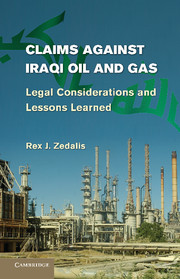Book contents
PART TWO
Published online by Cambridge University Press: 05 August 2011
Summary
The $50 billion to $70 billion owed by Iraq to foreign creditors, as reduced by the late 2009 Chinese quid pro quo regarding access to Iraqi oil in return for debt relief, and any other reductions not widely reported, would not seem subject to repudiation under an international legal notion of “odious debt.” As discussed in Chapter 2, it is questionable whether customary international law even endorses the idea of debt repudiation because it was assumed under odious circumstances. Were creditors to endeavor to commence legal action to recover what they deem owed of Saddam-era debts, however, they would be sure to encounter a variety of defensive claims and strategies. In the discussion in this part, an effort is made to examine the content and the developmental background of defenses and strategies grounded in resolutions of the UN Security Council that purport to insulate Iraqi oil and gas from legal action on such debts, as well as the provisions of Iraqi domestic law – national and regional – that appear to provide Iraqi governing authorities with wide latitude to vary the terms of previously negotiated oil and gas contracts while suffering no particular legal consequences for doing so.
The basic Security Council resolution now in effect that insulates Iraqi oil and gas from legal claims, resolution 1905, was adopted at the end of December 2009. By its terms, it remains effective only until the end of December 2010.
- Type
- Chapter
- Information
- Claims against Iraqi Oil and GasLegal Considerations and Lessons Learned, pp. 45 - 46Publisher: Cambridge University PressPrint publication year: 2010

